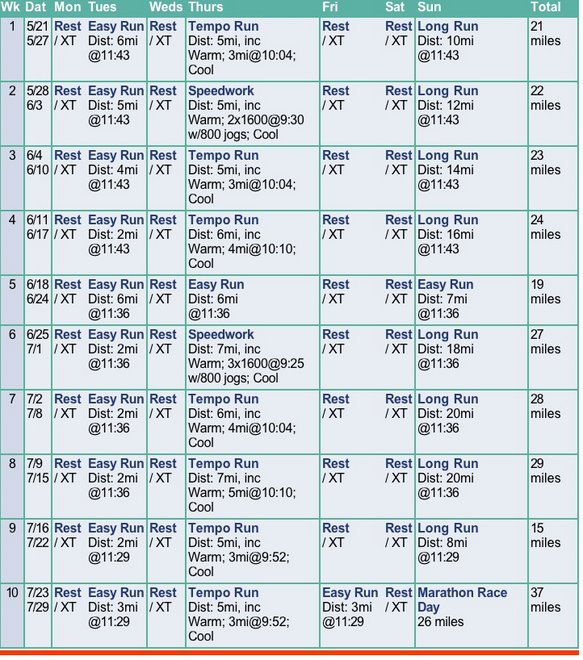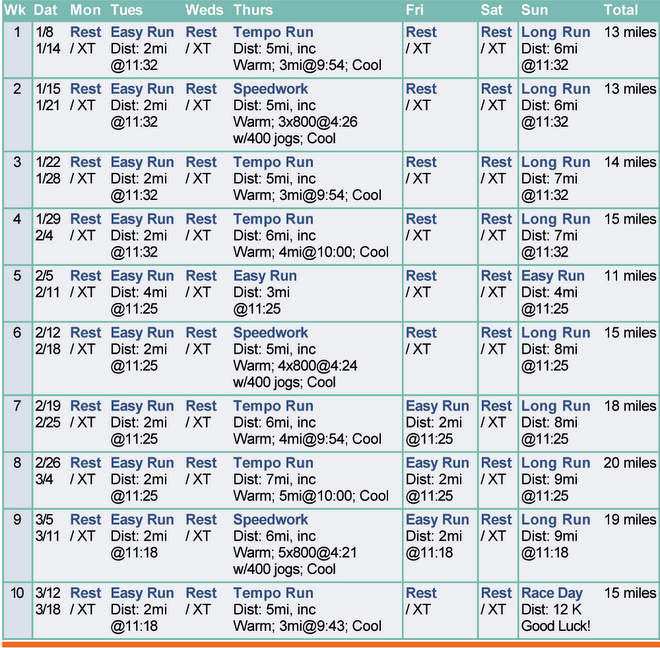I ordered both books online, but I'm not really planning on pitting them against each other. In fact, I don't plan on adopting the "Pfitz" plan any time soon (after the SF marathon?), but I am ready to get a bit more scientific about training. I'm still building base miles, trying to encourage my body to catch up with my ambitions, trying to keep it slow and patient, getting my mind to adjust to sustained pressure. Why is it that I can run for an hour and a half with relative ease, but a two minute dash to catch a train leaves me with heart pumping, struggling to catch my breath? Am I not pushing hard enough on my regular runs? Andy would say so. He thinks I should be forcing the pace up, chasing speed goals.
I want to be running farther and faster too, but most of my runs still leave me with tight calves, ominous shin aches, sore hamstrings. Part of that is expected, but I don't have any threshold for comparison. How hard is too hard to push, and what pains are run-of-the-mill, what pains are cause for carefulness? Case in point: after my long run Monday, the back of my left leg grimaced painfully along the whole length, painful even to stretch. It has only started to subside today, and the shin still aches. I want to get in a good hard run before Sunday's race, but is that wise? would a gentle 5 miles be better? if I do include a 6 mile tempo run, when should do it? should I give myself ample time to recover from Sunday rather than risk a real injury (run on Friday), or give myself ample recovery time before next Sunday (run on Thursday)?
Books aren't any substitute for experience, but I'm hoping they will give me context, new ways to measure and make meaning from the jumble of questions and impressions I've built up so far. After July 29th, maybe I'll be able to look back over a year of running and know things, crown myself "intermediate," set new goals. Until then, there are running books, and a break from all that poetry :)
Subscribe to:
Post Comments (Atom)


3 comments:
Whenever ramping up miles, aches and pains are pretty common. Give it some patience and you'll be fine. You're doing great, having run 8 miles the other day. Take it easy with the aches you're experiencing now. I'm not sure of the extent of it, but you might want to consider going ahead with the run with the idea of cutting it short at the first sign of trouble.
I'd recommend throwing in some speed workouts at the track. That'll help increase your lactate threshold and all of that good stuff. The Pfitzinger book probably explains it. I have his book, "Advanced Marthoning". I don't follow it exactly, but have combined elements from it and a few other plans, which is what a lot of people do. Good reading, for sure. The science behind training is fascinating and is almost as much fun as the training itself.
Most of the aches and pains you describe are common when you increase your mileage. Make sure you are backing off every three or four weeks to give your legs a chance to rest a little.
Once you get to the point where you're running 30 to 35 miles a week comfortably, your ready to start incorporating some interval training (to increase your VO2max) and tempo runs (to increase your Lactate Threshold). You'll find a great description of these in Pfitz's book.
Running those intervals will help you with the short sprints to catch a train.
I wouldn't push it this week considering you have your first 10K on Sunday (that's got to be exciting!). A single Tempo run between now and Sunday isn't going to help you do better in the 10K. In fact, I'd suggest that you treat the 10K as if it were a 6 mile tempo run. Start out at your usual pace for the first two miles, this will keep you from burning yourself out on the first mile and will ensure that you are good and warmed up before you start accelerating. Start to pick up the pace on mile 3 and increase the pace a little each mile after that. Just find someone 20 yards in front of you and slowly chase them down. You'll be able to finish strong and have a great PR for your first 10K
Good luck and keep icing those sore muscles. They'll get better.
While I'm in pretty much the same boat as you, new aches and pains-wise, my experience with endurance cycling has shown me that backing off is important when your body starts talking back.
One of the biggest problems I encountered was knee pain. It only really manifested itself during hard climbing which put a lot of pressure on the knees. It took about three years before that diminished to merely a dull ache after REALLY hard climbs and nothing after modest climbs.
Luckily the strength in my knees is serving me very well in the running I now do. Hopefully the same will be true for you with regard to your shins and other aches.
I concur with Phil. Start slow in the race. Even if you feel like you're slow, slow it down a tad more. The perception that you're slow, I believe, is an illusion brought on by the rest of the runners around you. If you're not passin' you must be flaggin'. Right? Took me a long time to manage to control myself at the start of races.
Post a Comment